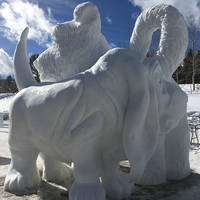"Discovered By Howard Carter In 1922, The Exquisite Alabaster Ship From Tutankhamun's Tomb Hails From The 14th Century Bce, Making It An Astonishing 3,300 Years Old"

"This remarkable example of ancient Egyptian artistry, elegantly nestled within an alabaster box, underscores the significance of ships in Egyptian traditions, embodying the voyage to the afterlife. Crafted for the young Pharaoh's eternal journey, this captivating artifact is now homed at the Egyptian Museum in Cairo"
6.

Delphi 1 year ago
Mose, I knew I'd seen the word before; took some meaning from the context; but yeah I had to look it up. Glad I did. I love me some deep etymology, and this is good. From dictionary.com:
First recorded in 1815–25; from Latin: “straps holding a baby in a cradle, earliest home, birthplace,” probably equivalent to unattested *incūnā(re) “to place in a cradle” ( in- in- 2 + unattested -cūnāre, verbal derivative of cūnae “cradle”) + -bula, plural of -bulum suffix of instrument; incunabula def 1 as translation of German Wiegendrucke
Lotsa words from this. First, in modern Spanish, a 'cuña' is a crib; no surprise there. I'm guessing English words such as 'county' and 'country' come from the same root. But of course, there is at least one word which has to come from the same source, but will rarely, if ever, be mentioned in school: cunt. Sorry if I ruffled anyone's feathers on that, but in linguistics, you talk about a word such as that the same way you'd talk about any other word. And remember, the same word in the same language can be inexcusably vulgar in one place, yet no more than a discourtesy in another place which speaks the same language. More than once, I've had to alert an Australian to the difference between the use of cunt in Australia and the use of it in the US. For the yankees in the house: in Australia it means something about the same as 'j#rk' in the US. Not exactly polite or graceful, but not gonna get you slapped. Of course, if we were to delve into the history of 'j#rk' in the States, it might reveal a somewhat more impolite meaning than it has now. And no, I'm not talking about its possible relation to 'Soda J#rk'.
First recorded in 1815–25; from Latin: “straps holding a baby in a cradle, earliest home, birthplace,” probably equivalent to unattested *incūnā(re) “to place in a cradle” ( in- in- 2 + unattested -cūnāre, verbal derivative of cūnae “cradle”) + -bula, plural of -bulum suffix of instrument; incunabula def 1 as translation of German Wiegendrucke
Lotsa words from this. First, in modern Spanish, a 'cuña' is a crib; no surprise there. I'm guessing English words such as 'county' and 'country' come from the same root. But of course, there is at least one word which has to come from the same source, but will rarely, if ever, be mentioned in school: cunt. Sorry if I ruffled anyone's feathers on that, but in linguistics, you talk about a word such as that the same way you'd talk about any other word. And remember, the same word in the same language can be inexcusably vulgar in one place, yet no more than a discourtesy in another place which speaks the same language. More than once, I've had to alert an Australian to the difference between the use of cunt in Australia and the use of it in the US. For the yankees in the house: in Australia it means something about the same as 'j#rk' in the US. Not exactly polite or graceful, but not gonna get you slapped. Of course, if we were to delve into the history of 'j#rk' in the States, it might reveal a somewhat more impolite meaning than it has now. And no, I'm not talking about its possible relation to 'Soda J#rk'.










embarrassed about your age, boomer?
I did now.
First recorded in 1815–25; from Latin: “straps holding a baby in a cradle, earliest home, birthplace,” probably equivalent to unattested *incūnā(re) “to place in a cradle” ( in- in- 2 + unattested -cūnāre, verbal derivative of cūnae “cradle”) + -bula, plural of -bulum suffix of instrument; incunabula def 1 as translation of German Wiegendrucke
Lotsa words from this. First, in modern Spanish, a 'cuña' is a crib; no surprise there. I'm guessing English words such as 'county' and 'country' come from the same root. But of course, there is at least one word which has to come from the same source, but will rarely, if ever, be mentioned in school: cunt. Sorry if I ruffled anyone's feathers on that, but in linguistics, you talk about a word such as that the same way you'd talk about any other word. And remember, the same word in the same language can be inexcusably vulgar in one place, yet no more than a discourtesy in another place which speaks the same language. More than once, I've had to alert an Australian to the difference between the use of cunt in Australia and the use of it in the US. For the yankees in the house: in Australia it means something about the same as 'j#rk' in the US. Not exactly polite or graceful, but not gonna get you slapped. Of course, if we were to delve into the history of 'j#rk' in the States, it might reveal a somewhat more impolite meaning than it has now. And no, I'm not talking about its possible relation to 'Soda J#rk'.